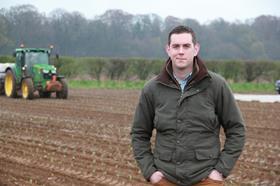
Joe Rolfe used to be one of those who, in his own words, described organics as “that old nonsense”.
That was before he did a placement year as part of a Harper Adams degree at PDM Produce and fell in love with fresh produce, took on a graduate role at Produce World’s Butterwick site, and was then transferred to the company’s now wholly-owned organic veg subsidiary Taylorgrown.
Based in Norfolk on the Lord Cholmondeley-owned Houghton Estate, Rolfe’s mentor was the firm’s founder John Taylor (who has since moved on) and who inspired him to see the innovation, technical expertise and long-term value in organic vegetable farming.
“It makes me laugh to hear what people dismiss about organics. We are just as commercial as any conventional farm,” he says. “I want the business to make money, I want good yields. Then you look at some of the things we’ve been doing with pest control. And we don’t get the same levels of disease as conventional – we have 60 to 70 per cent packouts, which is sometimes higher than non-organic.”
Taylorgrown’s turnover of £1.8 million comes from 400 acres of organic carrots, brassicas, onions and beetroots – in context, organic veg in the wider Produce World portfolio is bucking the trend of deflation in veg and seeing sales growth.
On the other hand, costs have risen 20 per cent in 10 years without any price increases, says Rolfe, pointing out that the company’s growth has therefore had to come from self-made efficiencies.
“Carrot fly is a massive issue for us. At one point 40 per cent of our crop was rejected for this. Because we can’t turn to chemicals, I did a lot of research into the lifestyle of the fly, and we then created trapping crops – flies overwintered in the designated carrot field and then we trapped them in fleece. Carrot fly levels are now between five and 10 per cent.”
The company also invested in Enviromesh netting to cover its entire 250-acre brassica crop, which reduced levels of pests and resulted in a much more consistent supply. Rolfe explains: “Even conventional growers have problems with consistency. So our retail customers have been very happy with our new levels of consistency since the netting.”
When Rolfe first arrived at Taylorgrown he noticed the same pieces of big kit and impressive technology that you’d see on any modern farm – nowadays, he believes organics even has lessons the conventional sector would benefit from. “I see some conventional growers and I think, ‘I could save you a lot of money by not doing a lot of needless stuff agronomists tell them to do, just to save a sleepless night’.”
Last year’s campaign of International Year of Soils brought this concept to the fore, he continues. “If you’re sick, then you’re more likely to get a cold. Soil is the same – if your soil’s sick from too many chemicals, crops are more likely to be diseased. We use no herbicides on the farm and we have no problems with blackgrass – we have to use natural methods such as weeding and ploughing.
“Hand-weeding and seasonal staff remain our biggest costs, and we need to do something about that, which is why robotics will come to the fore in the future.”
A new mechanical brassica planter has already cut the number of people needed to plant seven acres in one day from 14 down to one, who can now do the same acreage in half a day. This cost saving is designed to help the business remain profitable in the long-term, rather than yield better prices to retailers immediately, Rolfe stresses, adding that his long-term relationships with customers including Waitrose and Sainsbury’s have enabled him to make this point.
“Organic is at the cutting edge of technology because there are so many technological solutions to organic farming’s problems,” he says. “With the livestock, pigs, and crop rotations, Houghton for me has the perfect blueprint for sustainable agriculture. I truly believe in this system, and I think the whole farming system will one day have to adapt and to change.”



